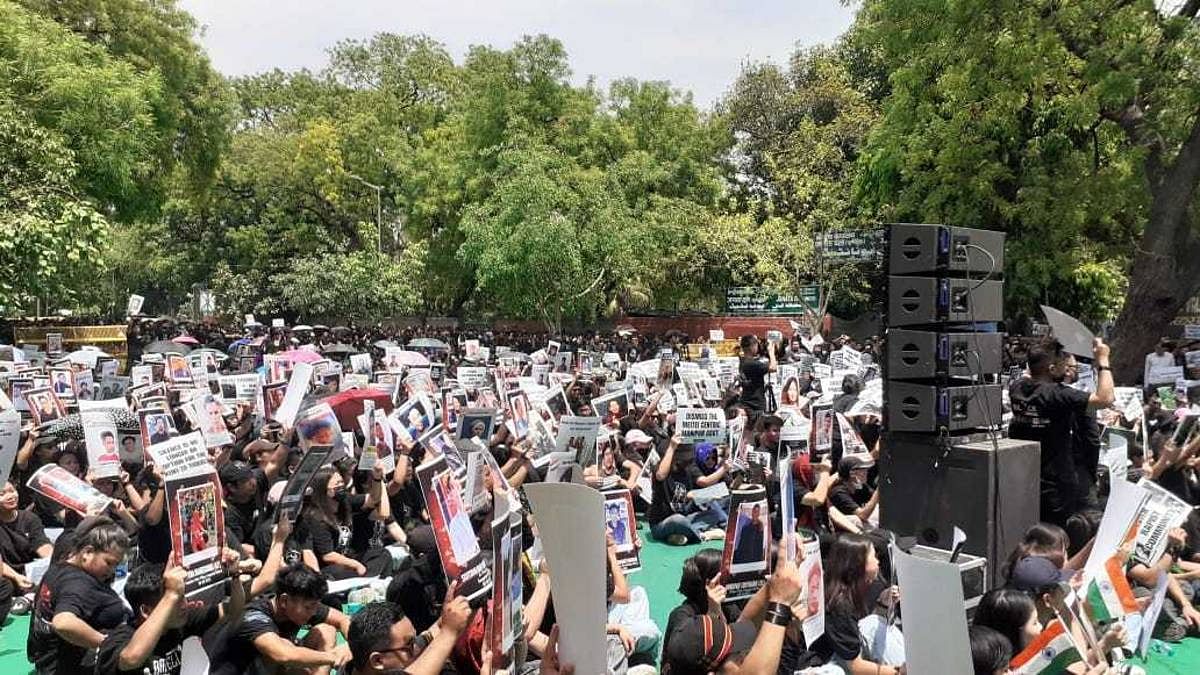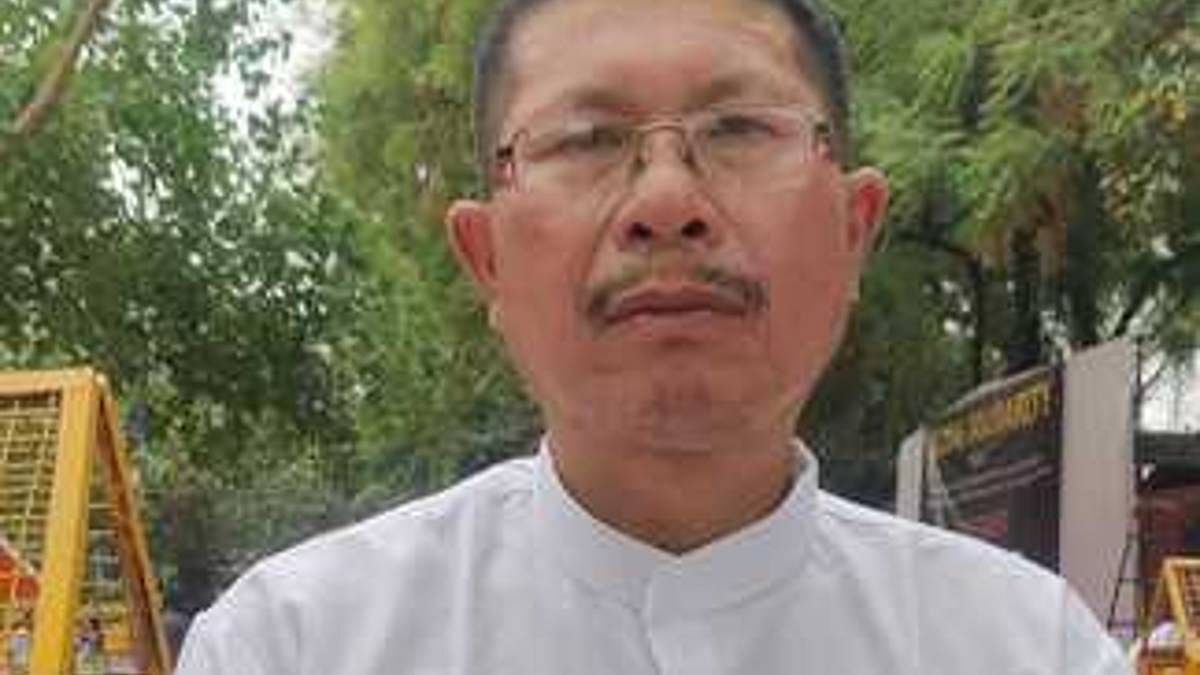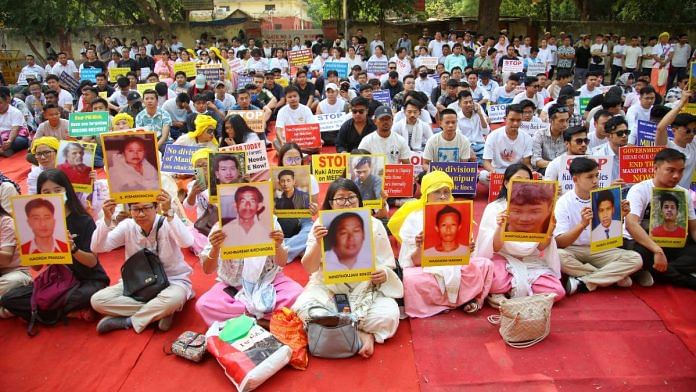New Delhi: The people of Manipur Friday marked one year of the ongoing ethnic conflict in the state between Kukis and Meiteis. Both the majority Meitei population and the Kuki-Zo tribals at the heart of the strife remained hopeful of reconciliation and called for justice for loved ones killed in the ethnic clashes.
At Jantar Mantar in New Delhi, members of the two communities held peaceful gatherings to look back at the ethnic conflict that has claimed more than 200 lives so far. Members of the Kuki-Zo community were dressed in black, while the Meiteis were dressed in white.
The Kuki-Zo gathering, organised by the Kuki Students’ Organisation in Delhi-NCR, saw over 500 students sitting under the scorching April sun, holding placards stating “protect us, we fear for our lives” and “justice precedes peace”, alongside photos of victims of violence. Families of several killed took to the stage to share their stories and express their pain.
Many attendees asked for justice and praised the Indian Army for keeping the peace in the state. Slogans such as “we want central forces” echoed through the crowd.
Mimin Doungel, a 29-year-old PhD scholar from Manipur University, recounted his struggle to resume his education after fleeing from capital Imphal amid the ethnic violence.
“My family is scattered. I am here and my savings are about to end. I have not been able to go back home. I fled from Imphal on 3 May when a mob entered our university specifically looking for Kuki students. They burned my laptop and documents. They burned everything I owned. There is no way for us to go back to our villages,” he told ThePrint.
Another student, 27-year-old Tingbem Khongsai from Langching village in Manipur, spoke about “survivor’s guilt” and expressed worry for her family back home.
“Every time I eat good food, wear good clothes, or go out, I think about my friends and family in Manipur and what they are going through. The conditions are much worse. My family has been living in a rented house since the violence broke out. Our house was burnt so we had no place to live,” she said.

Khongsai also raised concerns about relief camps and the burden on village volunteers.
“How long are the relief camps going to last? Most of them are full. Civil society groups or NGOs might help, but for how long? All the village volunteers are guarding villages not by choice but out of compulsion. Many of them are UPSC and SSC aspirants, even research scholars, but they are defending the frontlines. We need a solution. Nothing has changed in a year,” she added.
Later in the day, at least a hundred members of the Meitei community gathered at the same spot and called for restoration of peace in the state. They held placards that read “we Meiteis call for peace, justice, and reconciliation” and “Dear PM Modi, have you forgotten the missing Meities?”
Families of victims of the violence stood by a large poster that read “Global Solidarity… Call For Justice” and expressed their anguish. “I asked the Central Bureau of Investigation if they could just give me a part of my son’s body or his clothes so I could perform the rituals. I know he is not alive, we all saw the pictures,” said Ibungobi Phijam, father of Hemjit, one of the two students who disappeared from Imphal last July.

The two students, both from the Meitei community, were identified in photos that went viral on social media on 25 September. One photo purportedly showed their bodies under a tree, and the other featured them with armed men in the frame.
“I don’t think Manipur can ever be the same again even if the prime minister comes and visits the state. The glass is already broken,” he added.
Rojesh Seram, convener of Delhi Meitei Coordinating Committee and a journalist, spoke to ThePrint about the “normalisation of abnormality in Manipur” and the challenges the state faces due to political divisions.
“The central government is playing the game of divisive politics. Both communities want to live together peacefully but they are supporting militants. There is a jugalbandi (understanding) between the government and Kuki militants,” he alleged.
Violence had erupted in Manipur on 3 May last year following a solidarity march called by the All-Tribal Students’ Union Manipur to oppose the demand to grant Scheduled Tribe (ST) status to the non-tribal Meitei community. At present, Chin, Kuki, Zomi, Mizo, Hmar and Naga communities enjoy ST status in the state.
The ethnic conflict in Manipur has reportedly claimed at least 226 lives, including 20 women and 8 children. More than 1,500 have been injured, and an estimated 60,000 displaced within the state. Sporadic clashes continue despite presence of security personnel.
Also Read: Manipur is burning because of North Block’s legendary ignorance of the Northeast
‘We cannot build India by dividing states’
Just a few kilometres away from Jantar Mantar, the National Federation of Indian Women organised a discussion on the ongoing Manipur violence and challenges in the state at the Press Club of India.
The event began with the release of a documentary on the Manipur crisis, followed by a panel discussion moderated by senior journalist Pamela Philipose. The panel included CPI leaders Pallab Sengupta, Subhashini Ali and Annie Raja, and Delhi University professor Apoorvanand.
Members of both the Kuki and Meitei communities engaged in a peaceful dialogue and pushed for more fact-finding reports and ways to restore peace in Manipur.
“We are weak because we are not able to bring the Kukis and Meiteis together,” remarked Philipose during the discussion.

Annie Raja, who is also contesting against Rahul Gandhi from the Wayanad Lok Sabha seat in Kerala, recalled her visit to Manipur with her team. “If one community is in danger, the other also cannot stay in peace and Manipur is a prime example of that,” she said.
Both communities share two common sentiments: they had lost faith in the central government, and desired an end to the conflict so they could return to their normal lives.
“We appeal to every Indian, policymakers, the government and citizens who care about this country that we cannot build India by dividing states, by sowing hate and hurt among each other. Manipur is a reminder that this must stop right now,” said Binalakshmi Nepram, author and social rights activist, during the panel discussion.
(Edited by Nida Fatima Siddiqui)



